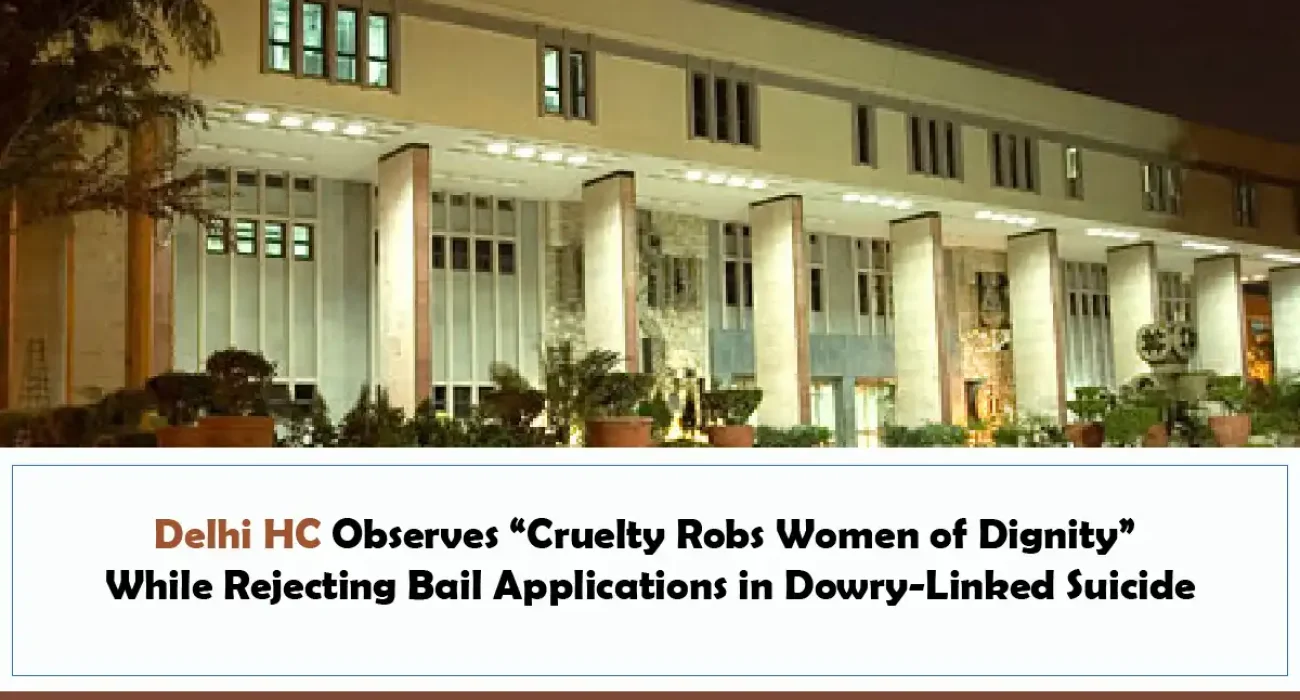

Table of Contents
ToggleThe matter arose from the tragic death of a woman, a 25-year-old woman who was found hanging in her parental home in Sector 23, Rohini, Delhi, on 22 August 2025. She had been married to Mr. S, on 18 April 2024. Following her unnatural death, no suicide note was recovered, prompting the involvement of the SDM, Kanjhawala, who recorded statements from her family members. According to these statements, the deceased had been subjected to persistent dowry demands and severe cruelty by her husband, father-in-law, brother-in-law, and their wives. The deceased’s mother alleged that the father-in-law had demanded gold, cash of ₹10 lakh, and other articles, while the brother-in-law and his wife pressured the deceased for additional amounts, including a Scorpio car. The deceased was reportedly beaten on multiple occasions, and on 12 and 13 August 2025, she was thrown out of her matrimonial home and had her mobile phone withheld. Despite attempts to comply with some of the demands, including depositing ₹3.5 lakh, the harassment continued. Ultimately, the deceased committed suicide in her parental home, and the postmortem was conducted on 24 August 2025. Consequently, FIR No. 553/2025 was registered at P.S. Begumpur under Sections 80, 85, and 3(5) of the Bharatiya Nyaya Sanhita (BNS), 2023.
The applicants, comprising the father-in-law, brother-in-law and sister-in-law, sought anticipatory bail, asserting that there were no specific allegations against them. They contended that any marital discord or incidents of cruelty had occurred solely between the husband and the deceased and that they were falsely implicated. It was further argued that the father-in-law and brother-in-law resided on separate floors and had no direct interaction that could amount to cruelty. The applicants also highlighted a nine-day gap between the last alleged incident and the deceased’s death, claiming a lack of direct involvement. They expressed willingness to join the investigation and asserted that no evidence needed recovery from them, thus seeking anticipatory bail.
The State opposed the bail applications. It was argued that within 15 months of marriage, the deceased had died under unnatural circumstances and that the statements of witnesses revealed sustained cruelty and harassment for dowry demands. The APP emphasized the severity of the dowry demands, including cash, ornaments, and a Scorpio car, and drew attention to transcripts of the deceased’s conversations with her mother, which documented beatings and threats from her husband and in-laws. The State also highlighted that the accused had not yet joined the investigation, and their mobile phones were switched off, indicating a lack of cooperation with law enforcement.
The Delhi High Court, presided over by Justice Swarana Kanta Sharma, meticulously analyzed the statements of the deceased’s mother, brother, and other family members, along with the transcript of phone conversations dated 12 and 13 August 2025. The Court noted that the deceased had been brutally beaten by her husband and threatened with further harm by her brother-in-law, and her mobile phone had been confiscated, forcing her to borrow a stranger’s phone to contact her mother. The Court observed, “It is profoundly unfortunate that, even in present times, many women continue to suffer cruelty within their matrimonial homes, inter alia, for demand of dowry. Such cruelty not only robs women of their dignity but, in many tragic cases, also costs them their lives. These incidents are a stark reminder that the fight against social evils like dowry and domestic violence is far from over.” The Court also rejected the argument that separate floor occupancy negated contact or potential cruelty, stating, “Evidently, the entire family was living in one house, though on separate floors, and thus, on this ground alone, the allegations against them cannot be considered as improbable or false.” The Court further took note of the applicants’ non-cooperation with the investigation and switched-off mobile phones, underscoring the need for accountability. However, regarding Akansha, the sister-in-law, the Court noted her empathetic communication with the deceased, stating, “The deceased herself told her mother on 13.08.2025 that sister- in-law had expressed anger at the conduct of the family members, and had confided that she too had earlier faced similar treatment before distancing herself from other family members.”
Considering the gravity of allegations, the evidence of sustained cruelty, and the applicants’ lack of cooperation, the Delhi High Court dismissed anticipatory bail applications of father-in-law and brother-in-law. However, recognizing sister in law’s empathetic stance and absence of active involvement, the Court granted anticipatory bail to her, subject to furnishing a personal bond of ₹10,000 with one surety of the like amount and compliance with conditions including joining the investigation, remaining contactable, and not influencing witnesses. The Court clarified that the order does not reflect any opinion on the merits of the case.
Written by Adv. Deeksha Rai
IAW resources
Browse our help directory